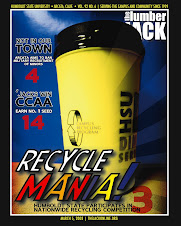Never! (That's just the headline of the issue)
You delivered your readers another good issue. The result: Increased readership. Last year it took 10 months before the Lumberjack Website broke 20,000 page views for a month. You did it in your first full month. You can see in the chart below that after losing your readers over the summer, you quickly regained the ground this past month. In theory, if we can repeat our growth rate this year, we could end in May 2009 with some 40,000 page hits a month.

Earlier this term, I griped that the second issue of the year was fluffy. You came back with a hard hitting third issue. I whined that in the last issue you failed to show rather than tell. You came back with stories filled with vivid descriptions. This is by far the strongest and most talented Lumberjack staff I've seen. You seem to eat up my criticisms and spit them back at me. Last week I spotted four good stories. This time I found six, plus the editorial: The Metro, the Garamendi preview, the student vote , the parking problem story, the Arcata theater and the football article. On top of that the weather in the calendar section was great!
So what what made the good stories good?
1. Ledes:
The white flag was up. With "Last Chance to Score" scrawled across teh front windows facing the Arcata Plaza, the Metro closed its doors for good on Saturday, Sept. 27.
(You didn't need both the Saturday and the date and would be stronger if it ended this way: ...closed its doors for good Saturday. Or: ....closed its doors for good Sept. 27.)
Political Science student Elise Gerhart said parking at her old school was also difficult, but it was free.2. Strong Sourcing.
Lara Cox sits surrounded by the beginnings of her "new baby," the partially-renovated historic Arcata Theater.
Lt. Governor John Garamendi canceled his visit to HSU last October due to the Southern California wildfires, but promised to reschedule the meetings. He will fulfill his vow on Friday by spending an hour with students talking about something that directly affects them -- higher education.
Interesting people with interesting perspectives filled these stories, providing juicy quotes.
"I needed to remodel the store to better accommodate body piercing, but had nothing left to invest, no m ore capital to spend, and when it got down to it, no more energy left to give," Noggle said. "I knew in my heart I was done."
"I try to get here at 8, 8:15 at the latest. Otherwise I have to park over by the high school," she said.
"What worked Saturday night was our passing attack," he said. "I hope to see more of the same attitude and energy, but at the same time cut down on crucial mistakes."
3. Powerful sentences

But when Noggle's insurance would no longer cover in-store shows, an essential part of cultivating interest in the community, everything took a nose dive.

Now before you start jumping for joy...
I did spot problems.
The story about the purchase of the industrial building was a mess. It was disorganized. It suffered from inconsistent use of tense (he said, he explains, Dean Davenport says.)
It missed the story: Buried in the last paragraph before the jump the reader learns that Plant Ops will move into the newly purchased building. That begs the question, what will go into Plant Ops? With a severe shortage of classroom and office space on this campus that's that one thing that will interest your readers the most.
Several stories began with quote ledes and I have never read a quote lede that worked. If you like the quote so much, take off the quote marks, paraphrase and cite the source. See:
When the government recruits young people to fight in Iraq, the government harvests our most precious resource. That's how Arcata City Councilman Dave Meserve sees it. "We believe it is the community's right to protect its youth," he says.
Even within stories you included dull quotes. Instead, paraphrase. As writers, you can probably say things better. Consider...
WASC concluded these processes are "complicated and favor the current ways of operation over strategic priorities."Instead...
WASC noted that complicated systems for budgeting and decision-making make it difficult to bring about needed change.So when someone says "Blah, Blah, Blah," ask yourself: What the heck are they really saying? Then take the quote marks off, paraphrase and just say it.
Don't make your readers read between the lines.
That was the problem with the Breakdown of Trust, the article about the hiring of Keeling and Associates. Here the story reads as if it is a perfectly normal thing to bring this consulting agency in to solve some communications problems. But a reader who reads between the lines says Whoa! $65,000 for a marriage counselor?
Here you failed to question the answers to the questions you asked: When someone says communications problem, you need to ask -- What do you mean exactly by "communication problem? Do you mean that the faculty and the administration aren't talking to each other?" Because if that is the problem, then the fact that the two groups are engaging in what is arguably infantile behavior is costing the school the equivalent of one full-time professor, or about $8 per student.
This is a story you could have had fun with by going over to the Department of Communications and finding a tenured professor willing to give the university advice for free on how to solve the communications problems. And you could have had fun with the graphics for it to. Perhaps two elementary school style report cards to show that the administration and faculty don't play well with each other.

You also made your readers read between the lines in the story about not so free speech. Here you presented a fascinating thing: That on this university campus, you can only exercise your First Amendment right of free expression at lunch Mondays thru Fridays. But instead of focusing on the limitation (the school blocks free expression 163 out of 168 hours a week) the article focused on the rational as expressed freely by Steven Butler.
You failed to question the answers to the questions you asked. One big rationale was that some free speech would disrupt classes. But the school allows very loud music during lunch on the quad even though classes are held at that hour next door in Siemen's Hall.

This story suffered from skewed balance. It is the job of a reporter to try to see things from all perspectives, to sort out hard evidence from opinion and falsehoods and then weigh it all against common sense. Don't ignore your gut instincts. If something smells wrong even though official sources tell you it is right don't let the official version override your common sense or sense of basic right and wrong. As long as you put forth the versions that counter your own so that ultimately the readers can make up their own minds you do your job.
Don't present an abnormal situation as normal or an outrageous situation as acceptible. Readers will think someone sold you a load of hooey or that you are trying to mislead them. That's no way to build credibility.

This story also suffered from insufficient sourcing. It begged for a constitutional rights expert and someone who advocates for First Amendment expression. There are a number of groups who do that from the California First Amendment Coalition to the ACLU.
Be Specific
The question and answer interview with Melissa Ruth suffered from vagueness. Again, question the answers to the questions you ask. You asked her where she gets her inspiration from. She said the songs start with a kernal of an idea. So you should then ask: Can you give me an example? Or what was the inspirati
 on for the song Bonafide?
on for the song Bonafide? Get art
Musicians are hungry for publicity. Most have photos online. Get their permission to use the photos from their MySpace page or get them to email you a digital shot of themselves.
Consider flipping your story
I don't know why, but many writers write backwards. On your second draft try flipping the story -- make your ending your lede and your lede your end and see if it works. That was the main problem with the story on the Arcata Theater, which was a good story regardless. At the end of the piece we find that community interest is high because it has been closed for so long. Then just before that is a discussion of why it has been closed for so long -- permit problems and funding.


























1 comment:
Where's Stephanie's media credit for her prize winning photo?
Post a Comment